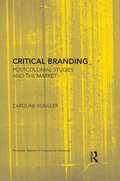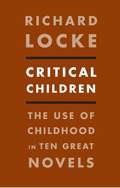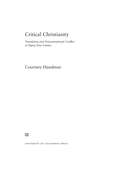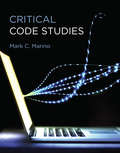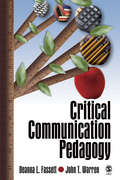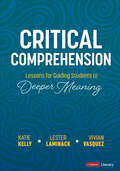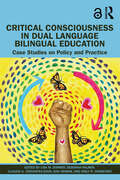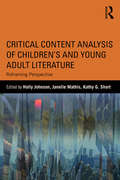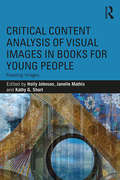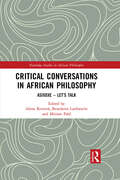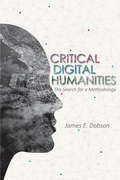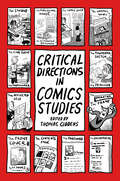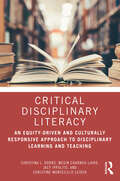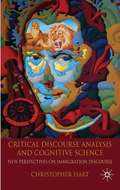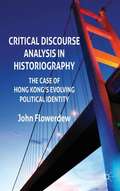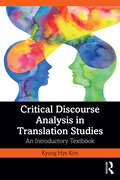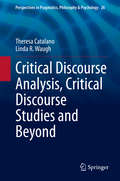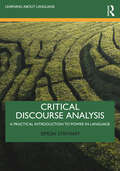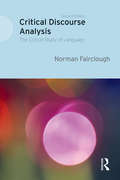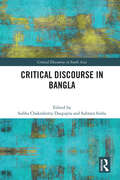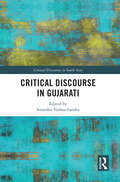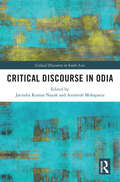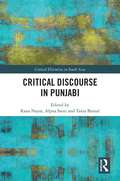- Table View
- List View
Critical Branding: Postcolonial Studies and the Market (Routledge Research In Postcolonial Literatures Ser.)
by Caroline KoeglerCritical Branding: Postcolonial Studies and the Market provides an original answer to what Sarah Brouillette has called postcolonial studies’ ‘longstanding materialist challenge’, illuminating the relationship between what is often broadly called ‘the market’ and the practice and positionality of postcolonial critics and their field, postcolonial studies. After much attention has been paid to the status of literary writers in markets, and after a range of sweeping attacks against the field for its alleged ‘complicity’ with capitalism, this study takes the crucial step of systematically exploring the engagement of postcolonial critics in market practice, substituting an automatic sense of accusation (Dirlik), dread (Westall; Brouillette), rage (Young; Williams), or irony (Huggan; Ponzanesi; Mendes) with a nuanced exploration and critique. Bringing together concepts from business studies, postcolonial studies, queer studies, and literary and cultural studies in an informed way, Critical Branding sets on a thorough theoretical footing a range of categories that, while increasingly current, remain surprisingly obscure, such as the market, market forces, and branding. It also provides new concepts with which to think the market as a dimension of practice, such as brand narratives, brand acts, and brand politics. At a time when the marketisation of the university system and the resulting effects on academics are much on our minds, Critical Branding is a timely contribution that explores how diversely postcolonial studies and the market intersect, for better and for worse.
Critical Children: The Use of Childhood in Ten Great Novels
by Richard LockeIn Critical Children, Richard Locke follows child characters in classic novels for adults and their use in exploring or evading social, psychological, and moral problems. Moving from Dickens's Oliver Twist, David Copperfield, and Pip in Great Expectations to Mark Twain's Tom Sawyer and Huckleberry Finn; from Henry James's Miles and Flora in The Turn of the Screw to J. M. Barrie's Peter Pan and his modern American descendent, J. D. Salinger's Holden Caulfield in Catcher in the Rye; and finally to Vladimir Nabokov's Lolita and Philip Roth's Alexander Portnoy, Locke traces the 130-year evolution of these iconic characters. Writing as editor, teacher, writer, and reader, Locke demonstrates the way these great books work, how they spring to life from their details, and how they function as verbal performances that both invite and resist interpretation and support rereading. Locke conveys the variety and continued vitality of these books as they shift from Victorian moral allegory to New York comic psychoanalytic monologue, as children evolve from agents of redemption to narcissistic prisoners of guilt and proud rage.
Critical Children: The Use of Childhood in Ten Great Novels
by Richard LockeThe ten novels explored in Critical Children portray children so vividly that their names are instantly recognizable. Richard Locke traces the 130-year evolution of these iconic child characters, moving from Oliver Twist, David Copperfield, and Pip in Great Expectations to Tom Sawyer and Huckleberry Finn; from Miles and Flora in The Turn of the Screw to Peter Pan and his modern American descendant, Holden Caulfield; and finally to Lolita and Alexander Portnoy. "It's remarkable," writes Locke, "that so many classic (or, let's say, unforgotten) English and American novels should focus on children and adolescents not as colorful minor characters but as the intense center of attention." Despite many differences of style, setting, and structure, they all enlist a particular child's story in a larger cultural narrative. In Critical Children, Locke describes the ways the children in these novels have been used to explore and evade large social, psychological, and moral problems. Writing as an editor, teacher, critic, and essayist, Locke demonstrates the way these great novels work, how they spring to life from their details, and how they both invite and resist interpretation and provoke rereading. Locke conveys the variety and continued vitality of these books as they shift from Victorian moral allegory to New York comic psychoanalytic monologue, from a child who is an agent of redemption to one who is a narcissistic prisoner of guilt and proud rage.
Critical Christianity: Translation and Denominational Conflict in Papua New Guinea
by Courtney HandmanIn Critical Christianity, Courtney Handman analyzes the complex and conflicting forms of sociality that Guhu-Samane Christians of rural Papua New Guinea privilege and celebrate as "the body of Christ. ” Within Guhu-Samane churches, processes of denominational schism-long relegated to the secular study of politics or identity-are moments of critique through which Christians constitute themselves and their social worlds. Far from being a practice of individualism, Protestantism offers local people ways to make social groups sacred units of critique. Bible translation, produced by members of the Summer Institute of Linguistics, is a crucial resource for these critical projects of religious formation. From early interaction with German Lutheran missionaries to engagements with the Summer Institute of Linguistics to the contemporary moment of conflict, Handman presents some of the many models of Christian sociality that are debated among Guhu-Samane Christians. Central to the study are Handman's rich analyses of the media through which this critical Christian sociality is practiced, including language, sound, bodily movement, and everyday objects. This original and thought-provoking book is essential reading for students and scholars of anthropology and religious studies.
Critical Code Studies: Initial Methods (Software Studies)
by Mark C. MarinoAn argument that we must read code for more than what it does—we must consider what it means.Computer source code has become part of popular discourse. Code is read not only by programmers but by lawyers, artists, pundits, reporters, political activists, and literary scholars; it is used in political debate, works of art, popular entertainment, and historical accounts. In this book, Mark Marino argues that code means more than merely what it does; we must also consider what it means. We need to learn to read code critically. Marino presents a series of case studies—ranging from the Climategate scandal to a hactivist art project on the US-Mexico border—as lessons in critical code reading.Marino shows how, in the process of its circulation, the meaning of code changes beyond its functional role to include connotations and implications, opening it up to interpretation and inference—and misinterpretation and reappropriation. The Climategate controversy, for example, stemmed from a misreading of a bit of placeholder code as a “smoking gun” that supposedly proved fabrication of climate data. A poetry generator created by Nick Montfort was remixed and reimagined by other poets, and subject to literary interpretation.Each case study begins by presenting a small and self-contained passage of code—by coders as disparate as programming pioneer Grace Hopper and philosopher Friedrich Kittler—and an accessible explanation of its context and functioning. Marino then explores its extra-functional significance, demonstrating a variety of interpretive approaches.
Critical Communication Pedagogy
by Dr Deanna L. Fassett Dr John T. WarrenIn this autoethnographic work, authors Deanna L. Fassett and John T. Warren illustrate a synthesis of critical pedagogy and instructional communication, as both a field of study and a teaching philosophy. Critical Communication Pedagogy is a poetic work that charts paradigmatic tensions in instructional communication research, articulates commitments underpinning critical communication pedagogy, and invites readers into self-reflection on their experiences as researchers, students, and teachers.
Critical Comprehension [Grades K-6]: Lessons for Guiding Students to Deeper Meaning (Corwin Literacy)
by Lester Laminack Vivian Maria Vasquez Katie KellyBecause high-level comprehension cannot be divorced from wide-ranging texts To be literate is to think through multiple perspectives, exploring diverse texts, and using the power of story to give students the life skills to discuss just about anything with critical curiosity. Critical Comprehension transforms this vital work into an accessible, three-step lesson process. Using picture books, multimodal texts, and thoughtfully framed questions, each differentiated lesson expands students’ understanding of a text through: First read: the "movie read", during which the text is read without interruption Second read: The teacher poses questions that probe deeper meanings through interaction with the text to summarize, name and highlight issues, analyze and infer, to make more informed decisions about what to believe and what to question. Third read: Harnessing students’ curiosities, the class revisits the text to talk back to theme, symbols, central idea, or social, cultural, historical influences at work on author and audience Popular media, classic novels, breaking news — the world’s content is ready for students to absorb. But are we ready to help them read it well? Equipped with this resource, the answer is, Yes, we are.
Critical Comprehension [Grades K-6]: Lessons for Guiding Students to Deeper Meaning (Corwin Literacy)
by Lester Laminack Vivian Maria Vasquez Katie KellyBecause high-level comprehension cannot be divorced from wide-ranging texts To be literate is to think through multiple perspectives, exploring diverse texts, and using the power of story to give students the life skills to discuss just about anything with critical curiosity. Critical Comprehension transforms this vital work into an accessible, three-step lesson process. Using picture books, multimodal texts, and thoughtfully framed questions, each differentiated lesson expands students’ understanding of a text through: First read: the "movie read", during which the text is read without interruption Second read: The teacher poses questions that probe deeper meanings through interaction with the text to summarize, name and highlight issues, analyze and infer, to make more informed decisions about what to believe and what to question. Third read: Harnessing students’ curiosities, the class revisits the text to talk back to theme, symbols, central idea, or social, cultural, historical influences at work on author and audience Popular media, classic novels, breaking news — the world’s content is ready for students to absorb. But are we ready to help them read it well? Equipped with this resource, the answer is, Yes, we are.
Critical Consciousness in Dual Language Bilingual Education: Case Studies on Policy and Practice
by Claudia G. Cervantes-Soon Deborah Palmer Emily R. Crawford Lisa M. Dorner Dan HeimanThis book features case studies that address dual language bilingual education (DLBE) programs, which offer content instruction in two languages to help youth develop fluent bilingualism/biliteracy, high academic achievement, and sociocultural competence. While increasingly popular, the DLBE model is a framework that comes with unique hurdles and challenges. Applying a pioneering critical consciousness approach, the volume provides readers with narratives, awareness, and tools to support culturally and linguistically diverse students and their families. Organized around four major areas—policy, leadership, family and community engagement, teaching and teacher learning—the volume’s case studies bring together stories from policymakers, educational leaders, family and community members, and teachers. The case studies spotlight examples in which power imbalances have been identified and shifted through critically conscious actions and offer insight into how to ensure all DLBE programs are nurturing, empowering, multilingual environments for all students, particularly racialized, immigrant, and transnational students. Accessible and varied, the case studies address important topics such as anti-Black racism, digital access, disability, school-district relations, working with undocumented families, and more. Each chapter includes a case narrative, teaching notes, discussion questions, and/or teaching activities to support stakeholders who wish to develop and enact equity in their DLBE policies, classrooms, and professional development. A key resource for supporting student needs and transformative inquiry in the classroom, this book is ideal for graduate students, professors, leaders, educators, and other stakeholders in bilingual education and language education.
Critical Content Analysis of Children’s and Young Adult Literature: Reframing Perspective
by Holly Johnson Kathy G. Short Janelle MathisIn this book the authors describe their strategies for critically reading global and multicultural literature and the range of procedures they use for critical analyses. They also reflect on how these research strategies can inform classrooms and children as readers. Critical content analysis offers researchers a methodology for examining representations of power and position in global and multicultural children’s and adolescent literature. This methodology highlights the critical as locating power in social practices by understanding, uncovering, and transforming conditions of inequity. Importantly, it also provides insights into specific global and multicultural books significant within classrooms as well as strategies that teachers can use to engage students in critical literacy.
Critical Content Analysis of Visual Images in Books for Young People: Reading Images
by Holly Johnson Kathy G. Short Janelle MathisExtending the discussion of critical content analysis to the visual realm of picturebooks and graphic novels, this book provides a clear research methodology for understanding and analyzing visual imagery. Offering strategies for "reading" illustrations in global and multicultural literature, chapter authors explore and bring together critical theory and social semiotics while demonstrating how visual analysis can be used to uncover and analyze power, ideologies, inequity, and resistance in picturebooks and graphic novels. This volume covers a diverse range of texts and types of books and offers tools and procedures for interpreting visual images to enhance the understandings of researchers, teachers, and students as they engage with the visual culture that fills our world. These methods are significant not only to becoming a critical reader of literature but to also becoming a critical reader of visual images in everyday life.
Critical Conversations in African Philosophy: Asixoxe - Let's Talk (Routledge Studies in African Philosophy)
by Alena RettováIn this edited collection contributors examine key themes, sources and methods in contemporary African Philosophy, building on a wide-ranging understanding of what constitutes African philosophy, and drawing from a variety of both oral and written texts of different genres. Part one of the volume examines how African philosophy has reacted to burning issues, ranging from contemporary ethical questions on how to integrate technological advancements into human life; to one of philosophy’s prime endeavours, which is establishing the conditions of knowledge; to eternal ontological and existential questions on the nature of being, time, memory and death. Part two reflects on the (re)definition of philosophy from an African vantage point and African philosophy’s thrust to create its own canon, archive and resources to study African concepts, artefacts, practices and texts from the perspective of intellectual history. The volume aims to make a contribution to the academic debate on African philosophy and philosophy more broadly, challenging orthodox definitions and genres, in favour of a broadening of the discipline’s self-understanding and locales. This book will be of interest to students and scholars of African philosophy and comparative philosophy.
Critical Digital Humanities: The Search for a Methodology (Topics in the Digital Humanities)
by James E DobsonCan established humanities methods coexist with computational thinking? It is one of the major questions in humanities research today, as scholars increasingly adopt sophisticated data science for their work. <P><P>James E. Dobson explores the opportunities and complications faced by humanists in this new era. Though the study and interpretation of texts alongside sophisticated computational tools can serve scholarship, these methods cannot replace existing frameworks. <P><P>As Dobson shows, ideas of scientific validity cannot easily nor should be adapted for humanities research because digital humanities, unlike science, lack a leading-edge horizon charting the frontiers of inquiry. <P><P>Instead, the methods of digital humanities require a constant rereading. At the same time, suspicious and critical readings of digital methodologies make it unwise for scholars to defer to computational methods. <P><P>Humanists must examine the tools--including the assumptions that went into the codes and algorithms--and questions surrounding their own use of digital technology in research. <P><P>Insightful and forward thinking, Critical Digital Humanities lays out a new path of humanistic inquiry that merges critical theory and computational science.
Critical Directions in Comics Studies
by Thomas GiddensContributions by Paul Fisher Davies, Lisa DeTora, Yasemin J. Erden, Adam Gearey, Thomas Giddens, Peter Goodrich, Maggie Gray, Matthew J. A. Green, Vladislav Maksimov, Timothy D. Peters, Christopher Pizzino, Nicola Streeten, and Lydia Wysocki Recent decades have seen comics studies blossom, but within the ecosystems of this growth, dominant assumptions have taken root—assumptions around the particular methods used to approach the comics form, the ways we should read comics, how its “system” works, and the disciplinary relationships that surround this evolving area of study. But other perspectives have also begun to flourish. These approaches question the reliance on structural linguistics and the tools of English and cultural studies in the examination and understanding of comics. In this edited collection, scholars from a variety of disciplines examine comics by addressing materiality and form as well as the wider economic and political contexts of comics’ creation and reception. Through this lens, influenced by poststructuralist theories, contributors explore and elaborate other possibilities for working with comics as a critical resource, consolidating the emergence of these alternative modes of engagement in a single text. This opens comics studies to a wider array of resources, perspectives, and modes of engagement. Included in this volume are essays on a range of comics and illustrations as well as considerations of such popular comics as Deadpool, Daredevil, and V for Vendetta, and analyses of comics production, medical illustrations, and original comics. Some contributions even unfold in the form of comics panels.
Critical Disciplinary Literacy: An Equity-Driven and Culturally Responsive Approach to Disciplinary Learning and Teaching
by Jacy Ippolito Christina L. Dobbs Megin Charner-Laird Christine Montecillo LeiderThis accessible book introduces a new theory of critical disciplinary literacy (CDL) that merges criticality and disciplinary literacy approaches in a cohesive and inclusive framework. There are unique hurdles in integrating critical and culturally sustaining approaches to literacy into specialized content area classrooms, but this book provides clear, research-grounded strategies and methods that will appeal to teachers and help them foster equitable literacy learning opportunities for all students. Using a critical lens, chapters deconstruct and reconstruct pathways for new practices that push back on familiar, normative literacy approaches in the disciplines. Authors provide a framework for designing new approaches to disciplinary literacy both for and with students, and they present innovative and practical strategies for implementation. With real-world examples from the field, this book will be essential reading for preservice teachers and in courses on literacy and disciplinary instruction.With vignettes and classroom examples from educators who have been enacting elements of CDL practices for years, this book will be essential reading for preservice educators in courses on both literacy and content instruction. Furthermore, current and seasoned educators and educational leaders will find this book to be an invaluable resource as they wrestle with how to teach disciplinary literacy in ways that move away from approaches that have historically marginalized many voices to approaches that include and center students’ languages, histories, and cultures.
Critical Discourse Analysis and Cognitive Science: New Perspectives on Immigration Discourse
by Christopher HartThis study advances a model for Critical Discourse Analysis which draws on Evolutionary Psychology and Cognitive Linguistics, applied in a critical analysis of immigration discourse. It will be of special interest to students and researchers with which to explore new perspectives in CDA.
Critical Discourse Analysis in Historiography
by John FlowerdewJohn Flowerdew shows how the critical analysis of the evolving discourse employed during a political process spanning more than a decade can provide both insights for discourse analysis and understanding of a real world political process, thereby demonstrating the potential role for critical discourse analysis in historiography, the writing of history. The political process in question is Hong Kong's transition of sovereignty from Great Britain to China. The book analyses the discourse of the outgoing British administration, on the one hand, and the creation of the new discourse of the Special Administrative Region of China, on the other. In addition, the book considers issues of intercultural discourse, where the two competing discourses come into contact and conflict. Individual chapters of the book, in the form of case studies, deal with different communicative events set piece speeches, public meetings, news articles, interviews, and television addresses. "
Critical Discourse Analysis in Translation Studies: An Introductory Textbook
by Kyung Hye KimCritical Discourse Analysis in Translation Studies is the first textbook to provide a systematic treatment of how CDA may be applied to the analysis of translated and interpreted texts.Kyung Hye Kim provides in-depth explanations about how various strands of CDA, from the M.A.K. Hallidayan analytical framework to Norman Fairclough’s dialectical relationship model and Teu van Dijk’s ideological square, can be employed in translation studies to deliver rich analyses of translated text. She demonstrates the ability of CDA to address complex translation practices, in both traditional and digital media, using various examples in different languages. With numerous exercises using authentic texts, this textbook empowers readers to apply a CDA framework in their own work.This accessible textbook is essential reading for all students of discourse and text analysis within translation and interpreting studies.
Critical Discourse Analysis, Critical Discourse Studies and Beyond (Perspectives in Pragmatics, Philosophy & Psychology #26)
by Linda R. Waugh Theresa CatalanoThis book explores the problem-oriented interdisciplinary research movement comprised of Critical Discourse Analysis (CDA) and Critical Discourse Studies (CDS) for scholars, teachers, and students from many backgrounds. Beginning with a Preface by renowned CDA/CDS scholar Ruth Wodak, it introduces CDA/CDS through examples of what its research looks like, delineates various precursors to CDA/CDS and important foundational concepts and theories, and traces its development from its early years until it became established. After the relationship between CDA and CDS is discussed, seven commonly cited approaches to CDA/CDS are outlined, including their connections and differences, their origins and development, major and associated scholars, research focus(es), and central concepts and distinguishing features. After a summary of critiques of CDA/CDS and responses by CDA/CDS scholars, the book provides an overview of its salient connections to other interdisciplinary areas of scholarship such as critical applied linguistics, education, anthropology/ ethnography, sociolinguistics, gender studies, queer linguistics, pragmatics and ecolinguistics. The final chapter describes how scholars use their knowledge of CDA/CDS to make a difference in the world.
Critical Discourse Analysis: A Practical Introduction to Power in Language (Learning about Language)
by Simon StathamThis book provides a comprehensive account of the discipline of Critical Discourse Analysis (CDA) and demonstrates multiple linguistic methods through which it exposes and demystifies ideologies that are present in institutional discourse. The book enables readers to critique the complexities of the relationship between language and power to expose the ideological operation of discourse. Proceeding from a theoretical grounding for CDA in contemporary society, the book comprises analysis of a wide range of discourse examples, including the news media, political speeches, public service leaflets and social media. Readers are guided through a diverse range of models in CDA in order to scrutinise and assess the role of language in society and to consider and challenge the principles of powerful networks, institutions and organisations.
Critical Discourse Analysis: The Critical Study of Language (Critical Discourse Analysis Ser.)
by Norman FaircloughBringing together papers written by Norman Fairclough over a 25 year period, Critical Discourse Analysis represents a comprehensive and important contribution to the development of this popular field. The book is divided into seven sections covering the following themes: language in relation to ideology and powerdiscourse in processes of social and cultural change dialectics of discourse, dialectical relations between discourse and other moments of social lifemethodology of critical discourse analysis research analysis of political discourse discourse in globalisation and 'transition' critical language awareness in education The new edition has been extensively revised and enlarged to include a total of twenty two papers. It will be of value to researchers in the subject and should prove essential reading for advanced undergraduate and postgraduate students in Linguistics and other areas of social science.
Critical Discourse in Bangla (Critical Discourses in South Asia)
by Subha Chakraborty Dasgupta Subrata SinhaThis volume forms a part of the Critical Discourses in South Asia series which deals with schools, movements and discursive practices in major South Asian languages. It offers crucial insights into the making of Bengali or Bangla literature and its critical tradition across a century. The book brings together English translation of major writings of influential figures dealing with literary criticism and theory, aesthetic and performative traditions and re-interpretations of primary concepts and categories in Bangla. It presents 32 key texts in literary and cultural studies from Bengal from the middle of the 19th to that of the 20th century, with most of them translated for the first time into English. These seminal essays cover interconnections with socio-historical events in the colonial and post-independence period in Bengal, including the background to the language movement in Bangladesh. They discuss themes such as integrative aesthetic visions; poetic and literary forms; modernism; imagination; power structures and social struggles; ideological values; cultural renovations; and humanism. Comprehensive and authoritative, this volume offers an overview of the history of critical thought in Bangla literature in South Asia. It will be essential for scholars and researchers of Bengali/Bangla language and literature, literary criticism, literary theory, comparative literature, Indian literature, cultural studies, art and aesthetics, performance studies, history, sociology, regional studies and South Asian studies. It will also interest the Bengali-speaking diaspora and those working on the intellectual history of Bengal and conservation of languages and culture
Critical Discourse in Gujarati (Critical Discourses in South Asia)
by Sitanshu YashaschandraThis volume forms part of the Critical Discourses in South Asia series, which deals with schools, movements, and discursive practices in major South Asian languages. It offers crucial insights into the making of Gujarati literature and its critical tradition across a century / several centuries. The book presents one of a kind historiography of Gujarati literature and of its critical discourse. It brings together English translations of major writings of influential figures dealing with literary criticism and theory, aesthetic and performative traditions, and re-interpretations of primary concepts and categories in Gujarati. It initiates an exploration into Gujarati critical discourse from the heather to neglected pre-colonial centuries and presents key texts in literary and cultural studies, some of which are being made available for the first time into English. These seminal essays explore complex interconnections understand the dynamics of critical discursive situations in Gujarati literature and to carefully construct a mobile post of observation that matches those dynamics. They offer a radical departure from the widespread historiographical practice in Indian writings of disregarding pre-colonial literary critical discourse. The book also offers a new and indigenous periodization of Gujarati literature and its critical discourse, derived from a fresh perception of Gujarati and Indian literary culture. Comprehensive and authoritative, this volume offers an overview of the history of critical thought in Gujrati literature in South Asia. It will be essential for scholars and researchers of Gujarati language and literature, literary criticism, literary theory, comparative literature, Indian literature, cultural studies, art and aesthetics, performance studies, history, sociology, regional studies, and South Asian studies. It will also interest the Gujarati-speaking diaspora and those working on the intellectual history of Gujarat and Western India and conservation of the language and their culture.
Critical Discourse in Odia (Critical Discourses in South Asia)
by Jatindra Kumar Nayak and Animesh MohapatraThis volume forms a part of the Critical Discourses in South Asia series which deals with schools, movements and discursive practices in major South Asian languages. It offers crucial insights into the making of Odia literature and its critical tradition across a century. The book brings together English translation of major writings of influential figures dealing with literary criticism and theory, aesthetic and performative traditions and re-interpretations of primary concepts and categories in Odia. It presents 25 key texts in literary and cultural studies from late 19th century to early 21st century, translated by experts for the first time into English. These seminal essays explore complex interconnections between socio-historical events in the colonial and post-Independence period in Odisha and the language movement. They discuss themes such as the evolving idea of literature and criteria of critical evaluation; revision and expansion of the literary canon; the transition from orality to print; emergence of new reading practices resulting in shifts in aesthetic sensibility; dialectics of tradition and modernity; and the formation, consolidation and political consequences of a language-based identity. Comprehensive and authoritative, this volume offers an overview of the history of critical thought in Odia literature in South Asia. It will be essential for scholars and researchers of Odia language and literature, literary criticism, literary theory, comparative literature, Indian literature, cultural studies, art and aesthetics, performance studies, history, sociology, regional studies and South Asian studies. It will also interest the Odia-speaking diaspora and those working on the intellectual history of Odisha and eastern India and conservation of language and culture.
Critical Discourse in Punjabi (Critical Discourses in South Asia)
by Rana Nayar Alpna Saini Tania BansalThis volume forms a part of the Critical Discourses in South Asia series which deals with schools, movements and discursive practices in major South Asian languages. It offers crucial insights into the making of the Punjabi language and literature, and its critical tradition across a century. The book brings together English translation of major writings of influential figures dealing with literary criticism and theory, aesthetic and performative traditions and re-interpretations of primary concepts and categories in Punjabi. It presents 30 key texts in literary and cultural studies from Punjab from the beginning of development of Punjabi language to its present form, with most of them translated for the first time into English. These seminal essays cover interconnections with socio-historical events in the medieval, colonial and post-independence period in Punjab. They discuss themes such as spiritual and aesthetic visions, poetic and literary forms, modernism, progressivism, feminism, Dalit literature, power structures and social struggles, ideological values, cultural renovations, and humanism. Comprehensive and authoritative, this volume offers an overview of the history of critical thought in Punjabi literature in South Asia. It will be essential for scholars and researchers of Punjabi language and literature, literary criticism, literary theory, comparative literature, Indian literature, cultural studies, art and aesthetics, performance studies, history, sociology, regional studies and South Asian studies. It will also interest the Punjabi-speaking diaspora and those working on the intellectual history of Punjab and conservation of languages and culture.
